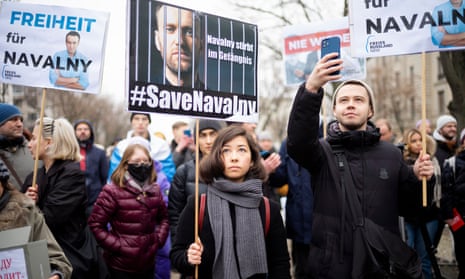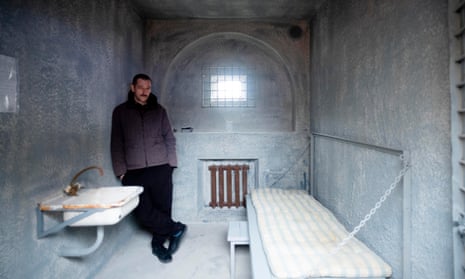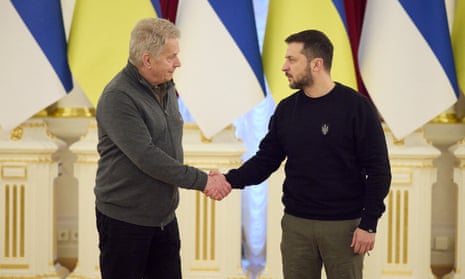Germany could approve Poland sending tanks to Ukraine by Wednesday, reports say
Germany could give approval to Poland for Warsaw to send Leopard 2 tanks to Ukraine as soon as Wednesday, Bloomberg is reporting.
Figures close to the decision spoke to the news outlet after Poland submitted a formal application on Tuesday. German law requires them to give approval before any of its military equipment is re-exported. Germany has said it will respond with “necessary urgency”.
It means hundreds of the tanks in Europe can only be supplied to Volodymyr Zelenskiy’s forces with politicians’ approval.
Key events
Summary of the day so far …
It is just approaching 8pm in Kyiv, and here is a summary of the day so far as discussions continue over whether Germany will allow Poland to send Leopard 2 tanks to Ukraine.
-
Germany could give approval to Poland to send Leopard 2 tanks to Ukraine as soon as Wednesday. Figures close to the decision spoke to the Bloomsberg news site after Poland submitted a formal application on Tuesday. German law requires them to give approval before any of its military equipment is re-exported. Germany has said it will respond with “necessary urgency”.
-
German newspaper Der Spiegel reports that a decision could be taken before Wednesday, and has indicated that president Olaf Scholz is likely to say yes to the request.
-
Nato secretary general Jens Stoltenberg is confident the alliance will find a solution soon, he said after meeting Germany’s defence minister. “At this pivotal moment in the war, we must provide heavier and more advanced systems to Ukraine, and we must do it faster,” Stoltenberg said.
-
The Wall Street Journal is reporting that the Biden administration is leaning toward sending Abrams tanks to Ukraine. The paper says Berlin would agree to send a smaller number of its own Leopard 2 tanks and would also approve the delivery of more German-made tanks by Poland and other nations in return.
-
In Ukraine, fifteen senior officials have left their posts since Saturday, six of whom have had corruption allegations levelled at them by journalists and Ukraine’s anti-corruption authorities. The deputy head of Ukraine’s presidential office, Kyrylo Tymoshenko, said on Tuesday he had asked President Volodymyr Zelenskiy on Monday to relieve him of his duties as part of the wave of government resignations and dismissals.
-
Deputy defence minister Vyacheslav Shapovalov, responsible for supplying troops with food and equipment, also resigned, citing “media accusations” of corruption that he and the ministry say are baseless. Deputy prosecutor general Oleksiy Symonenko has been removed from his post, and two deputy ministers resigned from Ukraine’s ministry of communities and territories development.
-
Five regional governors are also being removed from power: Valentyn Reznichenko, of Dnipropetrovsk, Oleksandra Starukha of Zaporizhzhia, Oleksiy Kuleba of Kyiv, Dymtro Zhivytskyi, of Sumy and Yaroslav Yanushevich, of Kherson. Kherson and Zaporizhizhia are two of the regions of Ukraine which the Russian Federation has claimed to annex.
-
The Bulletin of the Atomic Scientists has set its Doomsday Clock, intended to illustrate existential risks to the world, at 90 seconds to midnight, the closest to midnight the clock has ever been since it was first introduced in 1947. It is “largely” because of Russia’s invasion of Ukraine, they said.
-
Ukraine has enough coal and gas reserves for the remaining months of winter despite repeated Russian attacks on its energy system, prime minister Denys Shmyhal has said.
-
Finland’s foreign minister Pekka Haavisto has signalled a possible pause in discussions with Turkey over Finnish ambitions to join Nato alongside Sweden, which he says is due to the pressure of Turkey’s forthcoming election.
-
Supporters of jailed Russian opposition leader Alexei Navalny have gathered for a protest in Berlin on Tuesday to highlight the prison conditions he is being kept in, in Russia.
-
Russia does not plan to rebuild the Azovstal steelworks in Mariupol which were the site of heavy bombardment in the early weeks of Russia’s invasion of Ukraine last year.
-
Russian football officials met their counterparts at Uefa on Tuesday as they tried to negotiate Russia’s return to international football in Europe. It has been banned by Uefa and Fifa since the invasion of Ukraine.
Twenty-five people have been killed and more than 90 injured in Russia’s border region of Belgorod since the start of Moscow’s assault on Ukraine, the region’s governor has told president Vladimir Putin.
“Ukraine, the enemy, is targeting peaceful settlements. There are 25 dead, 96 people were wounded,” governor Vyacheslav Gladkov told Putin in televised remarks according to Agency France Presse.
This is the first time Russian officials have announced an official death toll for a Russian region since the start of Moscow’s offensive in Ukraine.


Supporters of jailed Russian opposition leader Alexei Navalny have gathered for a protest in Berlin on Tuesday to highlight the prison conditions he is being kept in, in Russia.
Navalny has been kept in a high security prison since June last year. He was initially jailed for breaking parole conditions – when he was taken to Germany to get lifesaving treatment after being poisoned with novichok – and was arrested immediately on his return.
Last June he was found guilty of further charges of embezzlement and contempt of court, with another nine years added to his initial two-and-a-half year term.
The protest takes place on the day where the documentary about him and his poisoning, Navalny, was nominated for an Oscar for Best Documentary Feature Film. For UK readers, who have not seen the film already, it is available on BBC iPlayer.
Here’s an interesting read by our reporters Shaun Walker and Pjotr Sauer on Yevgeny Prigozhin, the man behind the mercenary Wagner group that is fighting for Russia in Ukraine.
At the height of Russia’s first, covert invasion of eastern Ukraine, in summer 2014, a group of senior Russian officials gathered at the defence ministry’s headquarters, an imposing Stalin-era building on the banks of the Moskva River.
They were there to meet Yevgeny Prigozhin, a middle-aged man with a shaven head and a coarse tone whom many in the room knew only as the person responsible for army catering contracts.
Now, Prigozhin had a different kind of demand. He wanted land from the defence ministry that he could use for the training of “volunteers” who would have no official links to the Russian army but could still be used to fight Russia’s wars.
Many in the ministry did not like Prigozhin’s manner, but he made it clear that this was no ordinary request. “The orders come from Papa,” he told the defence officials, using a nickname for Vladimir Putin designed to emphasise his closeness to the president.
Read more:
Russia met with officials at Uefa on Tuesday as it tried to make its return to international football in Europe.
Russian Football Union vice-president Aleksandr Alaev declined to comment when leaving after three hours of face-to-face talks, Associated Press reports. They were the first discussions since Russia drew back from a threat last month to leave Uefa and seek to join the Asian Football Confederation.
Russian teams are banned from Uefa and Fifa competitions during the war in Ukraine and there currently is no way back from those decisions that were upheld at sport’s highest court.
National teams including Poland, Switzerland and Albania had refused within days of Russia’s invasion of Ukraine last February to play their scheduled games against Russia.
When the Uefa and Fifa bans imposed on 28 February were challenged at the Court of Arbitration for Sport, judges agreed that the consequences of letting Russian teams play “would be irreparable and chaotic” for the smooth running of competitions.
Russian teams were removed from trying to qualify for the men’s and women’s World Cups, the women’s 2022 European Championship which it had qualified for, plus European youth and club competitions.
Uefa also terminated sponsorship deals with Russian state energy firm Gazprom, moved the 2022 Champions League final from the home stadium of Zenit St Petersburg, and banned the club from this season’s Champions League group stages.
Russia does not plan to rebuild the Azovstal steelworks in Mariupol which were the site of heavy bombardment in the early weeks of Russia’s invasion of Ukraine last year.
According to the Russian Tass news agency, construction ministry official Yulia Maximova said it would be “impossible and unprofitable”.
The works were a major employer in the south-eastern city. The plant faced heavy shelling as thousands took refuge and many were killed – although figures differ.
Maximova said operations had been suspended and that it will “never operate as it previously did”.
She added that Russia planned to compensate people if the major employer isn’t restored.
Germany could approve Poland sending tanks to Ukraine by Wednesday, reports say
Germany could give approval to Poland for Warsaw to send Leopard 2 tanks to Ukraine as soon as Wednesday, Bloomberg is reporting.
Figures close to the decision spoke to the news outlet after Poland submitted a formal application on Tuesday. German law requires them to give approval before any of its military equipment is re-exported. Germany has said it will respond with “necessary urgency”.
It means hundreds of the tanks in Europe can only be supplied to Volodymyr Zelenskiy’s forces with politicians’ approval.
Doomsday Clock set at closest ever time to midnight after Ukraine invasion
The Bulletin of the Atomic Scientists has set its Doomsday Clock, intended to illustrate existential risks to the world, at 90 seconds to midnight, the closest to midnight the clock has ever been since it was first introduced in 1947.
Rachel Bronson, the president and CEO of the Bulletin, said the decision to move the clock forward from last year’s position of 100 seconds to midnight, was due “largely, though not exclusively, because of the mounting dangers in the war in Ukraine.”
The lowest point it had been was its previous setting of “100 seconds” in January 2020 to reflect worsening relations between superpowers. It was held at that point in 2021 and 2022.
During the cold war, which provided the backdrop for the metaphorical clock’s establishment, it reached two-minutes to midnight during hydrogen bomb tests by the US and Soviet Union in 1953.
US leaning towards sending Abrams tanks to Ukraine, reports say
The Wall Street Journal is reporting that the Biden administration is leaning toward sending Abrams tanks to Ukraine, and an announcement could come this week.
In a piece leading its website by Michael Gordon and Gordon Lubold, in which it says the White House has declines to comment, the paper writes:
The announcement would be part of a broader diplomatic understanding with Germany in which Berlin would agree to send a smaller number of its own Leopard 2 tanks and would also approve the delivery of more of the German-made tanks by Poland and other nations. It would settle a transatlantic disagreement over the tanks that had threatened to open fissures as the war drags into the end of its first year.
The shift in the US position follows a call on 17 January between President Biden and the German chancellor, Olaf Scholz, in which Biden agreed to look into providing the Abrams tanks against the judgment of the Pentagon. A senior German official said that the issue had been the subject of intense negotiation between Washington and Berlin for more than a week and appeared to be on the way to resolution.
Ukraine’s president Volodymyr Zelenskiy has posted to Telegram following his meeting in Kyiv today with president of Finland Sauli Niinistö. In the message, Zelenskiy said:
We held very fruitful, detailed and promising negotiations with president of Finland, Sauli Niinistö. Defence cooperation, protection of our energy industry, interaction in European structures, issues of regional security, the Ukrainian peace formula and other issues on which the security of our countries and the whole of Europe directly depends.
I thank Finland for its constant and principled support of our defence efforts, sanctions pressure on Russia, and international activity aimed at holding Russia accountable for terror.

Ukraine has enough coal and gas reserves for remaining winter months says PM
Ukraine has enough coal and gas reserves for the remaining months of winter despite repeated Russian attacks on its energy system, prime minister Denys Shmyhal has said.
Shmyhal said the situation in the energy sector remained difficult but under control after a months-long Russian campaign of drone and missile strikes on critical infrastructure that damaged about 40% of the energy system.
“For now all Russia’s attempts to plunge Ukraine into darkness have failed,” Shmyhal told a government meeting, Reuters reports.
“We have enough reserves to continue and end the heating season in normal mode. About 11bn cubic metres of gas are stored in gas storages and nearly 1.2m tonnes of coal are in storages.”
Ukraine state broadcaster Suspilne has reported that two people have been hospitalised in the Kharkiv region after shelling. It has posted to its Telegram channel to report:
The Russian military shelled the village of Lyptsi in the Kharkiv district: two volunteers were wounded, they were carrying humanitarian aid to Lyptsi. They were hospitalised.
German exports to Russia nearly halved last year to levels not seen since 2003, according to data seen by Reuters on Tuesday, as sanctions targeting Moscow for the war in Ukraine took their toll on once-close ties.
German exports to Russia slumped by 45% year-on-year to €14.6bn ($15.9bn) in 2022, according to preliminary data from the German Committee on eastern European Economic Relations.
Imports from Russia, however, grew by 11% to about €37bn due to high oil and gas prices, the group said in its report.
Germany’s trade deficit with Russia climbed to a record level of about €22bn as a result, the group’s executive director Michael Harms said.
The plunge in exports to Russia was most visible in motor vehicles and automotive parts, as well as electrical engineering products, Harms added, while pharmaceutical products and agricultural machinery, sectors which have been excluded from European Union sanctions, remained the top exports.
The German foreign minister has been speaking to the Council of Europe’s parliamentary assembly, where she said the discussion over tank supplies must not turn into “finger pointing”.
Annalena Baerbock visited the council of Europe and met the secretary general Marija Pejčinović Burić.
In her address to the council of Europe she urged unity and harmony while the debate over the supply of tanks rumbles on.
Baerbock was then questioned by politicians in Strasbourg, including UK Conservative party backbench MP Christopher Chope.
He said: “Although you don’t seem to recognise it, today you have made the most powerful and eloquent case for Germany to supply leopard tanks to Ukraine.
“Germany’s refusal of these essential resources to Ukraine is prolonging the war and emboldening Putin”. He asked what could be done to turn Baerbock’s words into action.
She replied: “If we start or continue this game to finger point at others because it is more convenient for one’s self then Russia and Putin wins.
“This is why I’m not calling on your country, on other’s countries, saying why haven’t the Howitzers 2000 been delivered when Netherlands and Germany delivered them.
“This ends nowhere. This ends only in dividing Europe. Therefore I have said already in the last days yes we have to do more to defend Ukraine, yes we have to do more on tanks. But the most important and crucial part is that we do it together and we do not do the blame game in Europe because we are fighting a war against Russia, and not a war against each other.”
-
An earlier version of this post stated that Baerbock and Chope were speaking at the EU’s parliamentary assembly. The UK is no longer a member of the EU, so Chope would not have been invited, but it retains a place at the 46-nation Council of Europe, where the exchange took place.
An air raid alert has been declared in Ukraine.
The BBC reports that a monitoring group covering Belarus has reported the take-off of a fighter jet in Belarus, which neighbours Ukraine to the north.
Germany to deal with Poland’s tank request ‘urgently’
Berlin will examine and make a decision over Poland’s application to send 14 Leopard 2 tanks to Ukraine “with necessary urgency”, a spokesperson has confirmed – but a decision could still take up to a fortnight.
On Tuesday a representative of the German government told journalists: “We will deal with the application with necessary urgency,” Agency France Presse reports.
Under Germany’s war weapons control rules, countries using German-made armaments are required to seek Berlin’s permission if they want to transfer the military equipment to a third party.
A German government source said a decision could be made within one to two weeks.
Downing Street has said the UK would not tell allies how they should specifically back Ukraine’s war effort, as Germany has come under widespread pressure over its decision to allow tanks to be sent to help push back the Russian invasion.
The prime minister’s official spokesperson said: “As the foreign secretary and others have said, we would like to see additional support provided to Ukraine.
“What we are not going to do is dictate to other countries exactly what they should or should not provide – first and foremost that must be for those countries,” he said, PA Media reports.
“We look to work with our allies in lockstep as much as possible.
“Our approach has borne fruit.”
